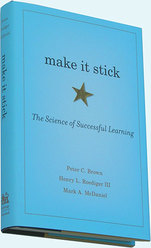I was pointed in the direction of the book by Christine Counsell and Michael Fordham. Michael in particular has posted three excellent blogs on the specific application of the book to issues of planning in history. (Blog 1, Blog 2, Blog 3). However, I wanted to focus more specifically on helping students to grasp some of the key points from the book. As such, I attach a PowerPoint which could be looked at in one, two or three sessions. I would suggest it will work best with KS4 or 5 and, in the spirit of creating a sense of urgency, should be linked to the idea that mastering memory is key to exam success.

The book also offers interesting challenges about discovery learning (which is rejected), enquiry learning (which is promoted) and self/peer assessment (it turns out that low ability kids generally self assess so badly it makes them think they are doing better than they are - even when they are shown really good examples). It also led me to thinking about where my students are in terms of their thinking. Clearly some students are falling down at the basic encoding stage of memory, whilst others are not consolidating fully. How this will pan out in the classroom, I am not yet sure.
In many senses, the book reinforces much of what good teachers already do, however it is good to have some basis for this belief. As I have not yet finished reading the book, I will be updating this resource as I go so please let me know what you think. Oh, and I have also just ordered 3,000 blank flashcards so my kids can get cracking on retrieval practice!!

 RSS Feed
RSS Feed
